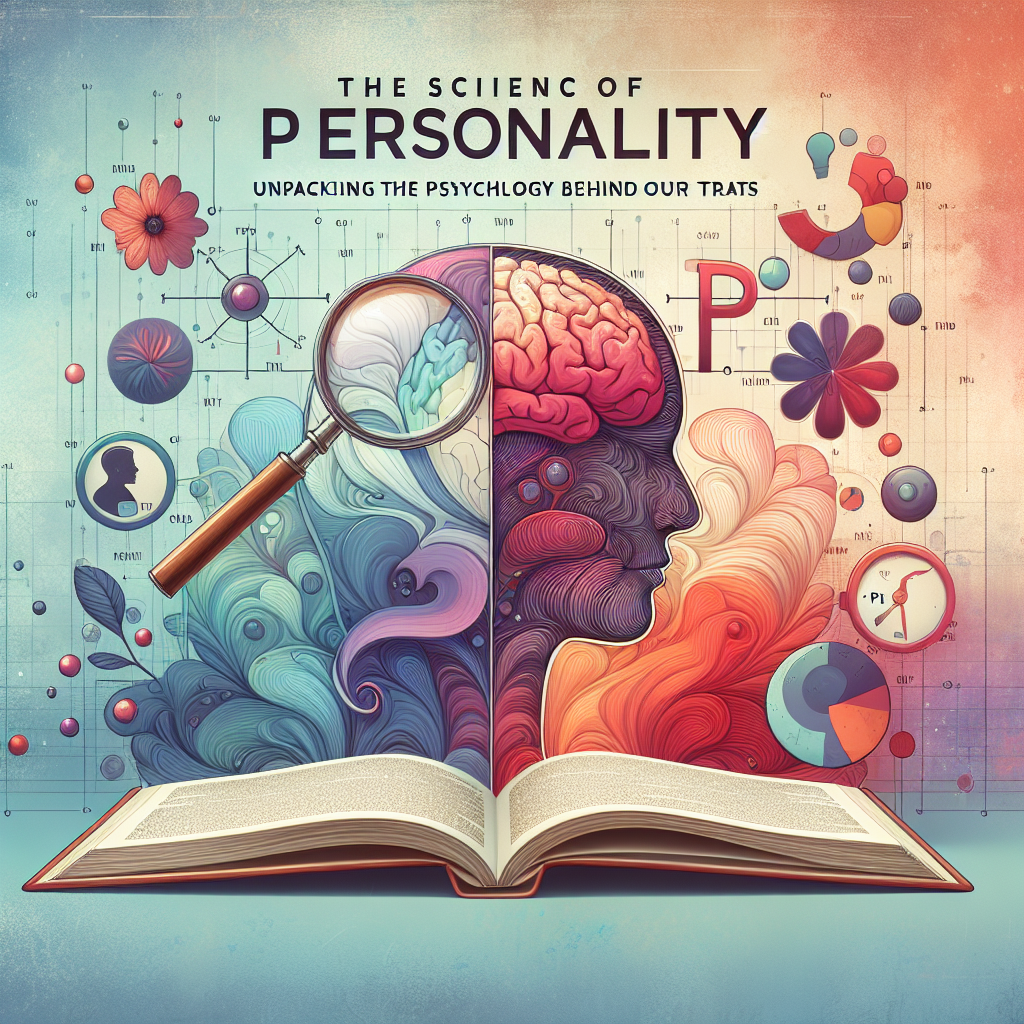
Introduction
Have you ever wondered why some people thrive in social situations while others prefer solitude? Or why certain individuals take the lead in groups while others play supportive roles? These questions about our differences lead us to delve into the heart of The Science of Personality: Unpacking the Psychology Behind Our Traits. Understanding personality is not just an academic pursuit; it can elevate personal development, enhance workplace dynamics, and improve interpersonal relationships.
In this exploration, we will unravel the complexities of personality through a scientific lens, dissecting the theories, findings, and implications that embody the essence of who we are. Prepare to embark on a journey that combines psychological insights with practical applications!
Understanding Personality: A Psychological Perspective
Defining Personality
Personality refers to the individual differences in characteristic patterns of thinking, feeling, and behaving. According to psychologists, it encompasses a wide array of traits, including openness, conscientiousness, extraversion, agreeableness, and neuroticism—often simplified as the "Big Five" personality traits.
The Big Five Personality Traits
| Trait | Description |
|---|---|
| Openness | Imagination, creativity, and willingness to try new things. |
| Conscientiousness | Self-discipline, organization, and achievement-oriented. |
| Extraversion | Sociability, enthusiasm, and assertiveness. |
| Agreeableness | Compassion, cooperativeness, and trust in others. |
| Neuroticism | Emotional instability, anxiety, and moodiness. |
The significance of these traits extends beyond academic interest; they influence various life aspects, from career success to relationship satisfaction.
Historical Perspectives on Personality
The study of personality didn’t start from scratch. Over the years, various theories have attempted to explain our behavioral uniqueness. Some prominent figures include:
- Sigmund Freud: Proposed the psychodynamic approach, emphasizing unconscious motives and childhood experiences.
- Carl Jung: Introduced concepts like introversion and extraversion, which remain central to personality theory.
- Abraham Maslow: Focused on self-actualization and the hierarchy of needs, highlighting the reach of human potential.
These theories laid the groundwork for modern psychology, providing frameworks for understanding personality traits profoundly.
The Science of Personality: Unpacking the Psychology Behind Our Traits
Modern research in personality psychology employs various approaches, from biological underpinnings to environmental factors. Let’s unpack these aspects in detail.
Biological Bases of Personality
Genetic Influences
New research in behavioral genetics reveals that genetics play a vital role in shaping our personalities. Twin studies have shown that identical twins raised apart often exhibit strikingly similar traits, suggesting a significant heritable component. For instance, research indicates that approximately 40-60% of personality traits can be attributed to genetic factors.
Brain Structures and Functions
Recent studies have identified brain regions linked to specific personality traits. For example, individuals high in conscientiousness tend to show greater gray matter volume in the prefrontal cortex, associated with planning and decision-making.
Case Study: The Neuroticism Gene
A breakthrough study identified a gene called SLC6A4, linked with serotonin transport, which correlates with higher levels of neuroticism. This connection emphasizes the biological underpinnings in emotional stability and presents a compelling narrative about the interplay between biology and personality.
Neurotransmitters and Personality
Neurotransmitters like dopamine and serotonin also play crucial roles in personality. Dopamine is associated with extraversion and reward-seeking behavior, while serotonin levels can influence both neuroticism and mood stability. Through understanding these chemical messengers, we can gain insight into how personality traits manifest in real life.
Environmental Influences on Personality
The Role of Culture
Culture shapes personality in profound ways. Individualistic cultures encourage self-expression and independence, while collectivist cultures value community and interdependence. For instance, a comparison between American and Japanese cultures reveals distinct personality trait distributions, illustrating how environment and upbringing influence our characteristics.
Case Study: The Cross-Cultural Personality Study
A landmark study across various cultures revealed that while the Big Five traits were universally recognized, the levels of traits varied significantly from culture to culture. This adaptability showcases how The Science of Personality: Unpacking the Psychology Behind Our Traits is inherently linked to cultural contexts.
Life Experiences
Events such as trauma, education, and relationships can profoundly alter personality. Significant life experiences not only shape how we view ourselves but can also modify our inherent traits over time.
Case Study: The Resilient Personality
Research into individuals who have experienced trauma highlights the role of resilience as a personality trait. Many who face adversity exhibit increased traits such as openness and conscientiousness, suggesting that tough experiences can lead to personal growth.
Parental Influence
Parental styles during childhood can set the stage for personality development. For example, authoritative parenting tends to yield children who display higher levels of conscientiousness and lower levels of neuroticism.
The Dynamic Interplay of Nature and Nurture
The Interaction of Genetics and Environment
The interaction between genetics and environment is pivotal in personality development. The diathesis-stress model posits that individuals with predisposing genetic traits may develop specific personalities under stress or adverse environments.
Case Study: The Resilient Children of Poverty
A study of children raised in impoverished neighborhoods revealed that those with supportive familial relationships displayed lower neuroticism despite their environment, stressing the significance of external factors in shaping innate traits.
The Practical Applications of Personality Psychology
Personality Assessments
Understanding personality can lead to better self-awareness and healthier relationships. Various assessments, such as the Myers-Briggs Type Indicator (MBTI) and the Big Five Inventory, can provide insights into one’s personality profile.
| Assessment | Focus | Strength |
|---|---|---|
| MBTI | Personality types based on dichotomies | Helpful for team dynamics and personal discovery. |
| Big Five Inventory | Measurement of the Big Five traits | Provides a comprehensive overview of key traits. |
Enhancing Workplace Dynamics
By applying personality psychology in the workplace, organizations can foster better team collaborations, improve communication, and increase overall productivity. Knowing your team’s personalities can lead to optimized roles and responsibilities.
Case Study: Google’s People Analytics Team
Google’s utilization of data-driven insights into personality has revolutionized their hiring processes and team compositions, demonstrating the powerful outcome of integrating The Science of Personality: Unpacking the Psychology Behind Our Traits into business practices.
Personal Development and Therapy
Understanding one’s personality fosters personal growth. Therapists often utilize personality insights to customize therapeutic approaches, tailoring interventions based on individual traits to enhance emotional well-being.
Conclusion
As we conclude our journey through The Science of Personality: Unpacking the Psychology Behind Our Traits, it’s essential to acknowledge that personality is not a static entity; it evolves with experiences, relationships, and self-awareness. This understanding can be empowering, offering actionable insights into improving personal relationships, workplace dynamics, and overall mental health.
Embrace the nuances of your personality, and use this newfound knowledge to forge deeper connections with others. Every personality trait offers unique strengths—embrace them!
FAQs
1. What are the Big Five Personality Traits?
The Big Five traits include openness, conscientiousness, extraversion, agreeableness, and neuroticism, which help understand human behavior and relationships.
2. How much of personality is determined by genetics?
Research suggests about 40-60% of personality traits are heritable, with various genetic and environmental factors intertwining.
3. Can personality change over time?
Yes, personality can evolve through significant life events, experiences, and conscious self-improvement efforts.
4. How can understanding personality improve relationships?
By recognizing personality differences, individuals can better understand communication styles, emotional responses, and behavioral preferences, leading to healthier relationships.
5. What is the best way to assess my personality?
Common assessments like the Myers-Briggs Type Indicator and the Big Five Inventory can provide valuable insights into your personality traits.
In essence, engaging with The Science of Personality: Unpacking the Psychology Behind Our Traits will not only enhance your understanding of yourself but will also deepen your interactions with others, leading to richer, more fulfilling relationships.











